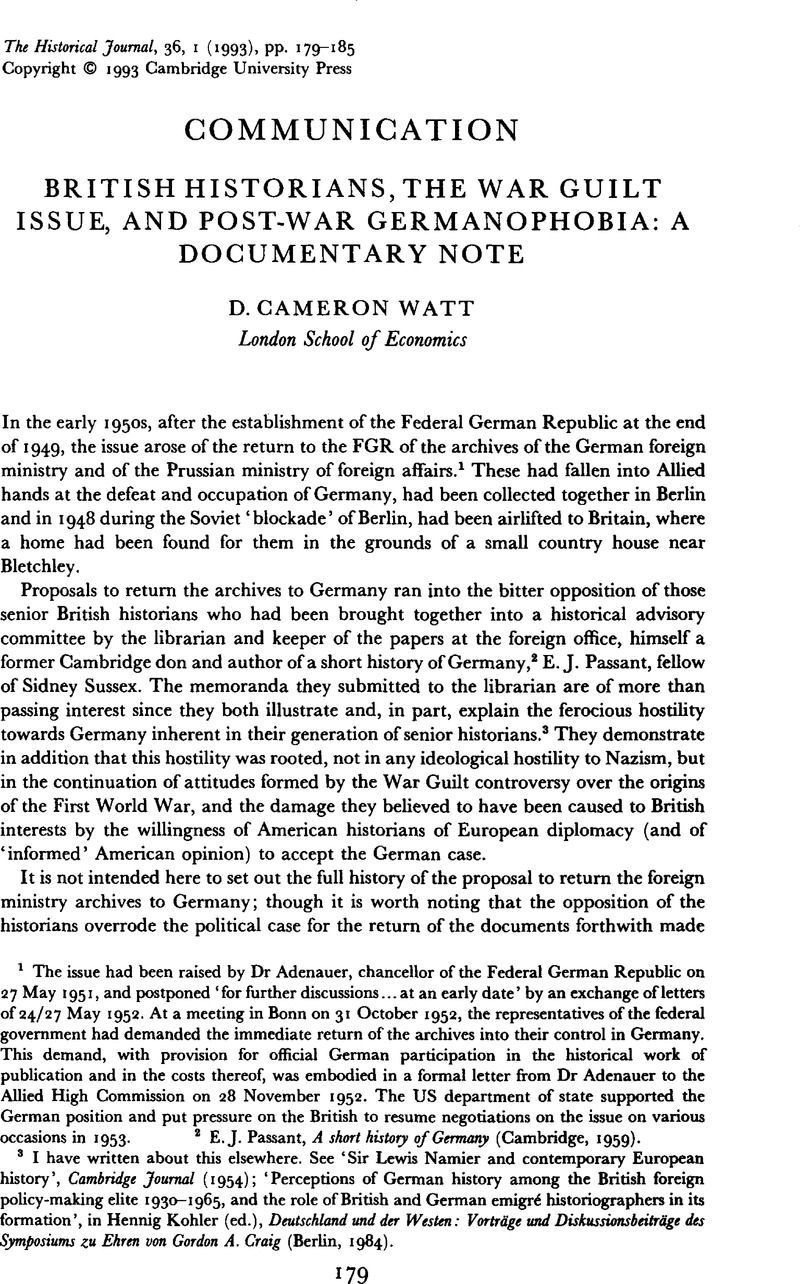Article contents
British Historians, the war guilt issue, and post-war germanophobia: a documentary note
Published online by Cambridge University Press: 11 February 2009
Abstract

- Type
- Communication
- Information
- Copyright
- Copyright © Cambridge University Press 1993
References
1 The issue had been raised by Dr Adenauer, chancellor of the Federal German Republic on 27 May 1951, and postponed ‘for further discussions … at an early date’ by an exchange of letters of 24/27 May 1952. At a meeting in Bonn on 31 October 1952, the representatives of the federal government had demanded the immediate return of the archives into their control in Germany. This demand, with provision for official German participation in the historical work of publication and in the costs thereof, was embodied in a formal letter from Dr Adenauer to the Allied High Commission on 28 November 1952. The US department of state supported the German position and put pressure on the British to resume negotiations on the issue on various occasions in 1953.
2 Passant, E.J., A short history of Germany (Cambridge, 1959)Google Scholar .
3 I have written about this elsewhere. See ‘Sir Lewis Namier and contemporary European history’, Cambridge Journal (1954); ‘Perceptions of German history among the British foreign policy-making elite 1930–1965, and the role of British and German emigré historiographers in its formation’, in Kohler, Hennig (ed.), Deutschland und der Westen: Vortraädge und Diskussionsbeiträge des Symposiums zu Ehren von Gordon A. Craig (Berlin, 1984)Google Scholar .
4 See J. Ward, deputy UK high commissioner in Germany, to Frank Roberts 118/2/8/58 of 9 Feb. 1953, LS 5/29 FO 370/2335.
5 French note of 29 Apr. 1954 LS 5/76 to the British government, FO 370/2372. Report by M. Fain to the French government, enclosed in M. Fair to Mr Passant, 29 Apr. 1954, LS 5/46g.
6 Memorandum by Mr Roberts, 2 Mar. 1953, FO 370/2335.
7 Minute on LSJ/46, FO 370/2372.
8 LS 5/260, 14 Dec. 1953, FO 3670/2345.
9 Later SirWheeler-Bennett, John. His own, now determinedly Germanophobe views were expressed in his book The nemesis of power (London, 1953)CrossRefGoogle Scholar .
10 l.e. the Allied publication of Documents on German foreign policy 1918–1945.
11 Not found.
12 See document (iii) below.
13 For the publication of other material demonstrating the role of the German foreign ministry's political archive section in withholding material, not easily reconciled with the official German case on the war guilt issue, see the Times Literary Supplement, letters from James Joll and Isabella Massey, September 1953.
14 Dr Richard Southern, the distinguished mediaevalist.
15 Professor of History in the University of London and an ex-vice chancellor of the university. One name conspicuously absent from Sir Llewellyn Woodward's list is that of the late Agnes Headlam–Morley, then professor of international relations at Oxford. She was, however, a well known Germanophile.
16 The documents concealed from Dr Thimme were later published by DrBonnin, Georges, who had served as one of the French historians on the inter-allied project. Bonnin, Georges (ed.), Bismarck and the Hohenzollem candidate for the Spanish throne. Documents in the German diplomatic archives 1869–70, translated by Isabella Massey (London, 1957)Google Scholar .
- 1
- Cited by




